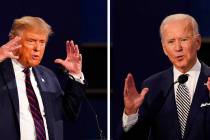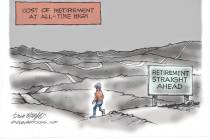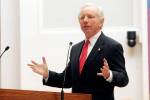Those raucous caucuses were partisan perfection
Anytime someone makes a point about the power of the news media, I perk up and take notice. After all, it is my ox being gored.
Such was the case when Columbia School of Law professor and election law expert Nathaniel Persily was quoted in the Review-Journal this past week in a story in which many people bemoaned the raucousness of the caucuses and pined for a nice, clean, civilized primary election.
In fact, state Sen. Dina Titus said she would introduce a bill reinstating a presidential primary. She was quoted as saying, "This notion of neighbors getting together with neighbors to talk about politics, that's just not Nevada.
"What I found in my caucus is that the meeting didn't lead to collaboration, cooperation and a good discussion. It led to hostility. It's too complicated."
This from a UNLV political science professor.
Professor Persily responded to such talk with this: "The move toward primaries has transferred power away from political parties to the media, who are then in a position to describe someone as having momentum."
Who am I to argue. He's right. And I for one don't want to be saddled with that power -- or the blame.
This was not a state-run election. This was a nominating process by the state's two largest political parties -- one in which the members of parties with two drastically differing philosophies are supposed to select the presidential candidate best suited to represent them.
Why should it be some hermitical and aseptic method akin to slouching on the couch and text messaging "American Idol" -- 555 for Obama, 666 for Clinton and 000 for Edwards?
No, with a nice, rough-and-tumble caucus, people have to stand up and defend their positions, actually state reasons and address issues, grapple with facts and weigh values face to face with someone who disagrees. But many appear to prefer to sit and do nothing more than read the newspaper, watch cable news and listen to talk radio, reaching conclusions without ever having to test their mettle in polemic combat.
Such a battle of minds would be the ideal, but in reality, at least with this virgin caucus attempt, the argumentation tended to be rather shallow. At one Democratic caucus site, the gym was packed with people decked out in T-shirts and pins engaged in persuasion by chanting "Hill-ar-y, Hill-ar-y" while stomping their feet on the bleachers in time to the chant. This was countered by the syllogistic logic of, "Yes, we can. Yes, we can."
At least it was in English. As for what it meant, who knows?
One woman was trying to garner the requisite 10 supporters in her precinct to qualify for a single delegate for John Edwards at the county convention. She was telling the uncommitted to give the underdog a chance. She assembled 11.
But even this tame exercise was too much for many, as our electronic mail bag attested.
One typical reader shouted in all caps, "YOUR NAME IS ON THE BALLOT -- that is against my civil liberties in my opinion."
"Throughout the process," wrote another, "my anger at having my friends and neighbors know how I was voting kept irritating me. Who you vote for is a private matter and is no one's business. I hope Nevada reconsiders and brings back a primary."
Still another politely recommended, "Whoever came up with this idiotic idea should be shot. Meanwhile, let's change our way to selecting candidates to a civilized format, with every eligible voter being able to make his/her selection in private and in secret ..."
Sorry, democracy is not a tea-sipping quilting bee. It should be an eye-gouging, club-swinging ruction in which some get bloodied and the best candidates survive because they can gather strong support by building up their own credentials, while pointing out the flaws in their opponents.
This is party politics.
As for me, I'll take the advice of an old friend:
"I have never submitted the whole system of my opinions to the creed of any party of men whatever in religion, in philosophy, in politics, or in anything else where I am capable of thinking for myself. Such an addiction is the last degradation of a free and moral agent. If I could not go to heaven but with a party, I would not go there at all."
-- Thomas Jefferson
March 13, 1789
Thomas Mitchell is editor of the Review-Journal and writes about the role of the press and access to public information. He may be contacted at 383-0261 or via e-mail at tmitchell@reviewjournal.com.























